Europe
Burger King’s Pride promotion was a miss, but not rock bottom
Burger King has been in hot water before over ad campaigns that were, by order of magnitude, more offensive and controversial than this one

AUSTRIA—It is a truth universally acknowledged, that a gay man who prefers being the receptive partner during anal sex is in want of a good top. When it is time for him to get down to business, another bottom in the room is about as useful as an empty container of lube.
The concept is so well worn, so axiomatic, that it was a surprise to see an ad agency working for Burger King Austria miss the mark so completely in its Pride themed campaign for the restaurant chain.
The Pride Whopper was unveiled on June 7 in social media ads featuring two versions of the restaurant’s signature burger – one with two domed and sesame seeded top buns, the other with two flat bottom buns – accompanied by the message, “Time to be proud.”
Of course, Twitter users were quick to point out that two bottoms or two tops is about as symbolic of pride and about as much a reason for celebration as a spilled bottle of video head cleaner.
The ad agency, Jung von Matt Donau, issued an apology on LinkedIn Saturday: “The intended message of the ‘Pride Whopper’ was to spread equal love and equal rights. Our strongest concern is if we offended members of the LGBTQ Community with this campaign. If this is the case, we truly apologize.”
The reaction online ranged from confusion and bewilderment to angry messages like this Instagram comment: “WTF. What are you actually DOING to support the community? Aside from this MESS?”
It seems likely that the campaign would have landed better if the joke had worked. A former employee with furniture maker Mitchell Gold + Bob Williams recalled a Pride themed promotion in which the company’s Parsons dining table – whose tops and bases can be interchanged – was featured with the slogan “sexy bottom seeks perfect top” spelled across the showroom windows.
Burger King has been in hot water before over promotions and ad campaigns that were, by orders of magnitude, more offensive and controversial than this one.
It was just last year that Burger King UK tweeted, on International Women’s Day, no less, “Women belong in the Kitchen.” The provocative move was intended to draw attention to gender disparities in the restaurant and food service industries, but instead drew ire for reinforcing sexist tropes.
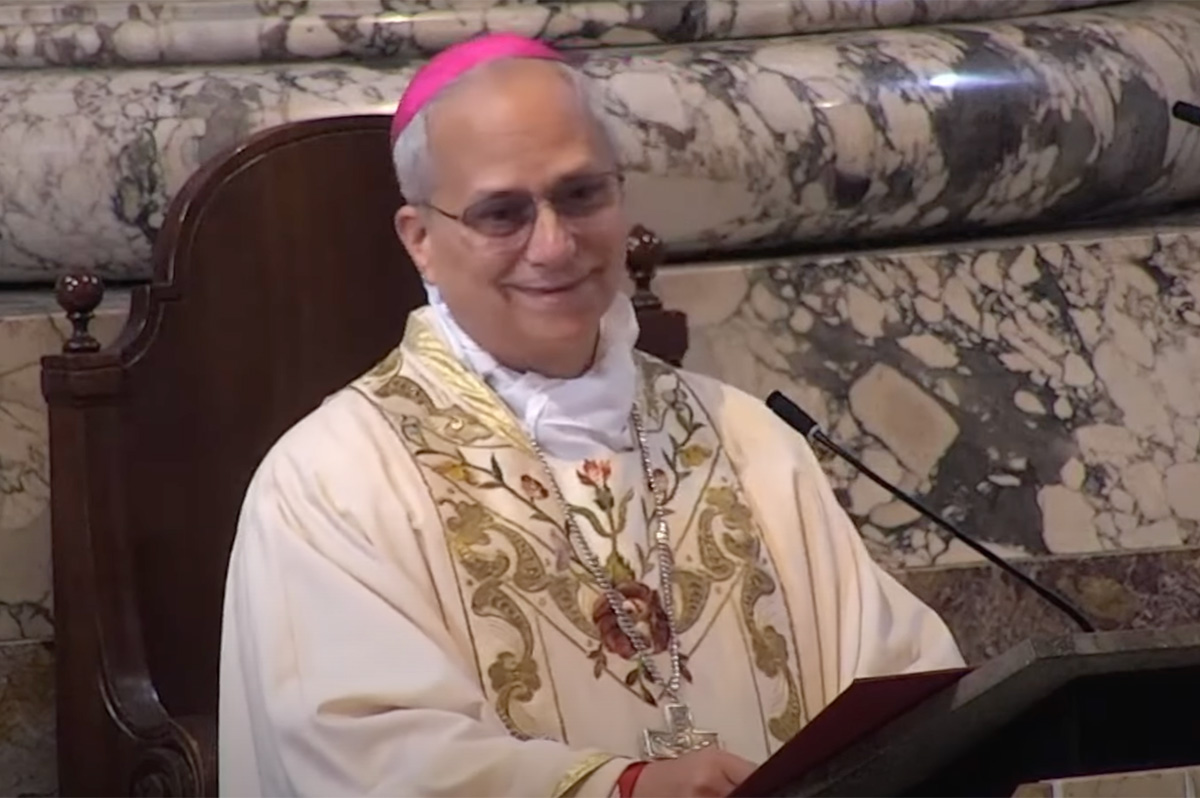
The College of Cardinals on Thursday elected Cardinal Robert Prevost from Chicago as the Catholic Church’s next pope.
Leo XIV’s election took place less than three weeks after Pope Francis died at Casa Santa Marta, his official residence at the Vatican. The conclave to choose his successor began on Wednesday.
Leo XIV, who was born in Chicago in 1955, is the first American pope.
Leo XIV was bishop of the Diocese of Chiclayo in Peru from 2015-2023. Francis made him a cardinal in 2023
“We salute the appointment of the new Pope Leo XVI,” said the U.S. Embassy in Peru on X. “A celebration for the world’s Catholics, and a joy especially shared between the American people and the Peruvian people. From Chicago to Chiclayo.”
U.S. Rep. Robert Garcia (D-Calif.), a gay man of Peruvian descent, also congratulated Leo XIV.
“As a Catholic and Peruvian American, I wish Pope Leo XIV strength as he steps into his role as a global and spiritual leader,” said the California Democrat on X. “He has demonstrated that he believes in justice for the poor and immigrants. May his leadership reflect these ideals as he spreads peace across the world.”
As a Catholic and Peruvian American, I wish Pope Leo XIV strength as he steps into his role as a global and spiritual leader. He has demonstrated that he believes in justice for the poor and immigrants. May his leadership reflect these ideals as he spreads peace across the world.
— Congressman Robert Garcia (@RepRobertGarcia) May 8, 2025
Francis died on April 21 at Casa Santa Marta, his official residence at the Vatican. The conclave to choose the Argentine pontiff’s successor began on Wednesday.
The Vatican’s tone on LGBTQ+ and intersex issues softened under Francis’s papacy, even though church teachings on homosexuality did not change.
Francis, among other things, described laws that criminalize consensual same-sex sexual relations as “unjust” and supported civil unions for gays and lesbians. Transgender people were among those who greeted Francis’s coffin at Rome’s St. Mary Major Basilica before his burial on April 26.
The New York Times reported Leo XIV in a 2012 speech to bishops specifically cited “homosexual lifestyle” and “alternative families comprised of same-sex partners and their adopted children” when he said Western media and popular culture has promoted “sympathy for beliefs and practices that are at odds with the gospel”
Marianne Duddy-Burke, executive director of DignityUSA, a group that represents LGBTQ+ Catholics, traveled to Rome for the conclave.
She told the Los Angeles Blade in a text message from St. Peter’s Square shortly after Leo XIV’s election that she “heard him speak” last October and “found him thoughtful and gently challenging.”
“[He] hasn’t said a lot since early 2010s. [I] hope he has evolved,” said Duddy-Burke. “His commitment to synodality is a hopeful sign.”
Her group later issued a statement.
“This election appears to signal a willingness to continue building on Pope Francis’s commitment to synodality and social justice,” said DignityUSA. “We pray that the needs of those whom our church has historically marginalized, including LGBTQ+ people and their families, will continue to be heard and addressed by the Vatican and other church leaders.”
Francis DeBernardo, executive director of New Ways Ministry, a Maryland-based LGBTQ+ Catholic organization, in a statement said there is “a special pride in having the first pope from the United States, his longtime ministry in Latin America most likely had an equally formative influence on his spirituality and approach to church issues.” DeBernardo, however, criticized Leo XIV’s 2012 comments.
“We pray that in the 13 years that have passed, 12 of which were under the papacy of Pope Francis, that his heart and mind have developed more progressively on LGBTQ+ issues, and we will take a wait-and-see attitude to see if that has happened,” he said.
“We pray that as our church transitions from 12 years of an historic papacy, Pope Leo XIV will continue the welcome and outreach to LGBTQ+ people which Pope Francis inaugurated,” added DeBernardo. “The healing that began with ‘Who am I to judge?’ needs to continue and grow to ‘Who am I, if not a friend to LGBTQ+ people?'”
DignityUSA agreed.
“We express concern with the former Cardinal’s statements — as reported in the New York Times — in a 2012 address to bishops, where he stated that Western news media and popular culture fostered ‘sympathy for beliefs and practices that are at odds with the gospel’ including the ‘homosexual lifestyle’ and ‘alternative families comprised of same-sex partners and their adopted children.'” We note that this statement was made during the papacy of Benedict XVI, when doctrinal adherence appeared to be expected,” said the organization in its statement. “In addition, the voices of LGBTQ people were rarely heard at that level of church leadership. We pray that Pope Leo XIV will demonstrate a willingness to listen and grow as he begins his new role as the leader of the global church.”
The Vatican
Potential Pope Francis successor views homosexuality as an ‘abomination’
Cardinal Fridolin Ambongo Besungu is archbishop of Kinshasa
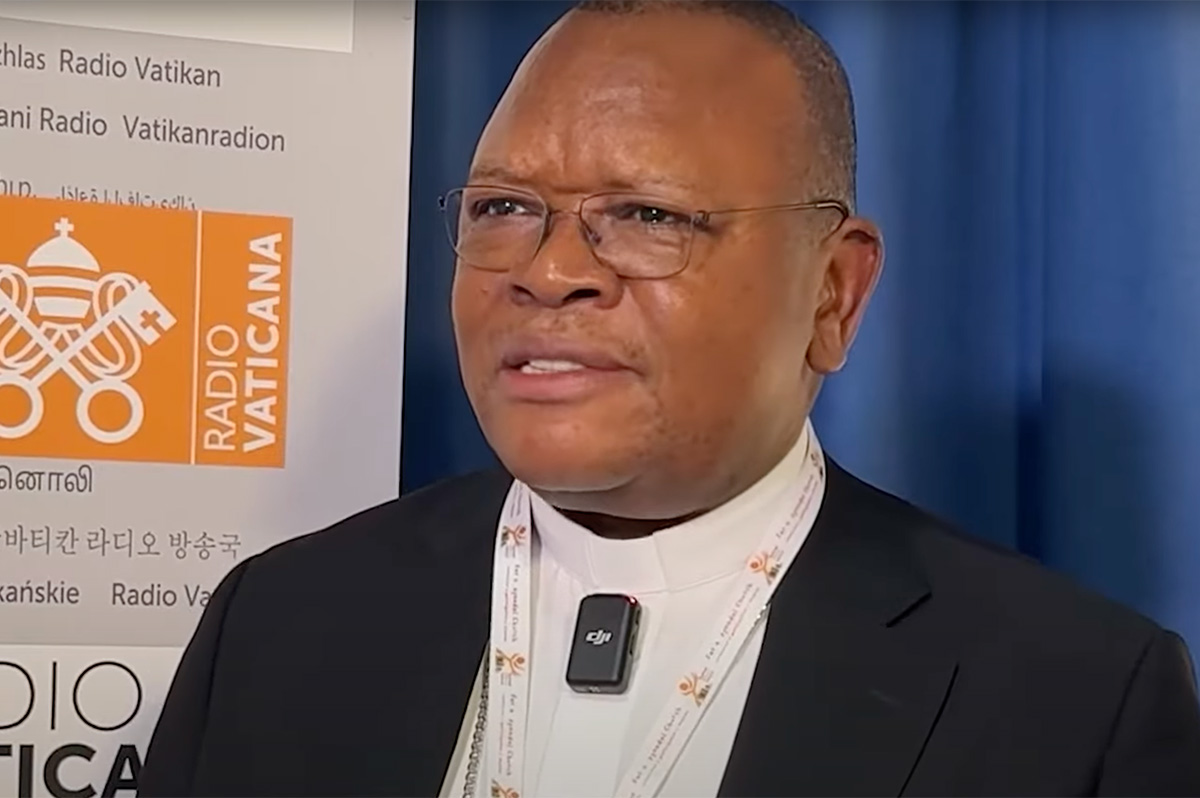
One of the cardinals who is reportedly in the running to succeed Pope Francis has described homosexuality as an “abomination.”
Cardinal Fridolin Ambongo Besungu, the archbishop of Kinshasa in Congo, made the comment in a Symposium of Episcopal Conferences of Africa and Madagascar statement in response to Francis’s 2023 decision to allow priests to bless same-sex couples.
“Within the church family of God in Africa, this declaration has caused a shockwave, it has sown misconceptions and unrest in the minds of many lay faithful, consecrated persons, and even pastors and has aroused strong reactions,” wrote Ambongo in the Jan. 11, 2024, statement he signed. “The African Bishops’ Conferences emphasize that people with a homosexual tendency must be treated with respect and dignity, while reminding them that unions of persons of the same sex are contrary to the will of God and therefore cannot receive the blessing of the church.”
The statement notes several Biblical passages that “condemn homosexuality, notably Lv. 18:22-23 where homosexuality is explicitly prohibited and considered an abomination.”
“In addition to these biblical reasons, the cultural context in Africa, deeply rooted in the values of the natural law regarding marriage and family, further complicates the acceptance of unions of persons of the same sex, as they are seen as contradictory to cultural norms and intrinsically corrupt,” it reads.
Ambongo, who is president of the Symposium of Episcopal Conferences of Africa and Madagascar, in 2024 said homosexuality “does not exist” in Africa outside of “a few isolated cases.” La Croix, a French Catholic newspaper, reported he made the comment during a rally that took place outside of Kinshasa.
Actualité, an online Congolese newspaper, reported Ambongo reiterated his opposition to homosexuality and same-sex unions in his 2023 Christmas message.
“Same-sex unions are not accepted in our church,” he said. “Although homosexuals should be treated with respect, compassion, and sensitivity, homosexuality remains a moral disorder contrary to natural law and our African culture.”
Jérémie Safari, executive director of Rainbow Sunrise Mapambazuko, a Congolese LGBTQ+ rights group, criticized Ambongo when he spoke with the Los Angeles Blade.
“This cardinal is very homophobic; very, very homophobic,” said Safari.
Francis died on April 21.
The Vatican’s tone on LGBTQ+ and intersex issues softened under the Argentine-born pope’s papacy, even though church teachings on homosexuality did not change.
Francis, among other things, described laws that criminalize consensual same-sex sexual relations as “unjust” and supported civil unions for gays and lesbians.
Francis last August met with two African activists — Clare Byarugaba of Chapter Four Uganda and Rightify Ghana Director Ebenezer Peegah — at the Vatican last August. Francis in 2023 visited Congo and South Sudan.
Juan Carlos Cruz, a GLAAD board member who survived clerical sex abuse in Chile, is among the hundreds of thousands of people who attended Francis’s funeral that took place at the Vatican on April 26. Transgender people were among those who greeted Francis’s coffin at Rome’s St. Mary Major Basilica before his burial.
The conclave to select Francis’s successor will begin on May 7.
The Associated Press notes Vatican Secretary of State Cardinal Pietro Parolin; Cardinal Luis Antonio Tagle, the former archbishop of Manila in the Philippines; Archbishop of Bologna (Italy) Cardinal Matteo Zuppi; and Archbishop of Esztergom-Budapest (Hungary) Cardinal Peter Erdo are among those who are considered potential Francis successors.
“He [Erdo] has been reluctant to take positions on several of the government’s policies that divided society in Hungary, such as public campaigns that villainized migrants and refugees and laws that eroded the rights of LGBTQ+ communities,” said the AP.
New Ways Ministry, a Maryland-based LGBTQ+ Catholic organization, in an April 21 statement said it hopes “our loving God, who is a God of justice and equality, will continue to bless us by extending Francis’ welcoming and inclusive message in the next papacy.”
Anti-LGBTQ+ Catholic figures offered a far different view.
Doug Mainwaring — described as a “marriage, family, and children’s rights activist” — on Monday described Guinean Cardinal Robert Sarah as “the only conclave participant to counter LGBT ambiguity and lies of Francis pontificate” in a post that LifeSiteNews, an anti-LGBTQ+ Canadian Catholic website, published.
“There is just one cardinal about to enter the conclave who is crystal clear, fearless, and uncompromising with the truth when it comes to pastoring those of us who experience same-sex attraction and gender confusion: Cardinal Robert Sarah,” wrote Mainwaring.
Mainwaring also highlighted anti-LGBTQ+ comments that Sarah made in his 2019 book.
“I think that the first victims of the LGBT ideology are the persons who experience a homosexual orientation. They are led by its militants to reduce their whole identity to their sexual behavior,” Sarah wrote, according to Mainwaring. “I beg Catholics who are tempted by homosexuality not to let themselves be shut away in this prison of LGBT ideology. You are a child of God by baptism! Your place is in the church, like all Christians. And if sometimes the spiritual combat becomes too hard, fraternal charity will support you.”
Catholic League President Bill Donohue on April 22 urged the cardinals to consider an African counterpart to succeed Francis.
“If the cardinals decide to choose someone who is a traditionalist, they can do no better than to look to Africa. It is home to the most brilliant orthodox clergy in the world,” said Donohue. “If the cardinals want to choose someone more like Francis, they will look to Europe.”

Pope Francis died on Monday at his official residence at the Vatican. He was 88.
Cardinal Kevin Farrell, the Vatican camerlengo, said Francis passed away at Casa Santa Marta at 7:35 a.m. local time (1:35 a.m. ET.)
“His entire life was dedicated to the service of the Lord and of his church,” said Farrell. “He taught us to live the values of the Gospel with fidelity, courage, and universal love, especially in favor of the poorest and most marginalized. With immense gratitude for his example as a true disciple of the Lord Jesus, we commend the soul of Pope Francis to the infinite merciful love of the one and triune God.”
Francis, a Jesuit who was previously known as Jorge Mario Bergoglio, was born in Buenos Aires to Italian immigrant parents in 1936. He became archbishop of the Argentine capital in 1998.

Pope John Paul II in 2001 appointed him cardinal. The College of Cardinals in 2013 elected Francis to succeed Pope Benedict XVI after he resigned.
Francis vehemently opposed Argentina’s marriage equality law that then-President Cristina Fernández de Kirchner signed in 2010. Francis as pope backed civil unions for gays and lesbians and in 2023 said priests can bless same-sex couples.
Francis in 2023 said laws that criminalize homosexuality are “unjust.” He appointed Robert McElroy, an LGBTQ+-friendly cardinal from San Diego, as the new archbishop of Washington.
The pontiff in 2015 met with a group of gay, transgender, and HIV-positive prisoners in the Italian city of Naples. A Vatican charity in 2020 gave money to a group of trans sex workers in Italy who were struggling to survive during the COVID-19 pandemic.
Francis last October met with a group of trans and intersex Catholics and LGBTQ+ allies at the Vatican. GLAAD President Sarah Kate Ellis and Juan Carlos Cruz, a gay Chilean man who is a clergy sex abuse survivor, are among those who also met with Francis during his papacy.
Church teachings on homosexuality and gender identity, however, did not change under his papacy.
“From the early months of his papacy when he uttered the now-iconic ‘Who am I to judge?’ in response to a question about accepting gay priests, through numerous affirming pastoral messages to individual LGBTQ+ people, to his support for civil unions, and his condemnation of criminalization laws, Pope Francis has changed the church irreversibly by allowing people to see how their Catholic faith requires acceptance and equality,” said Francis DeBernardo, executive director of New Ways Ministry, a Mount Rainier, Md., based LGBTQ+ Catholic advocacy organization, in a statement.
DignityUSA Executive Director Marianne Duddy-Burke met Francis in 2023.
The group in a statement acknowledged the pontiff’s “legacy on LGBTQ+ issues is complicated,” noting “even with the recognition of so many positive words and actions, church teachings and even some recent Vatican documents remain problematic.” DignityUSA President Meli Barber nevertheless praised Francis.
“We also recognize that Pope Francis has raised awareness of LGBTQ+ issues in our church in truly unprecedented ways,” said Barber. “He spoke about us using our own terms and made a point of being seen meeting with LGBTQ+ people frequently. This sent a message of recognition and inclusion we never experienced from the Vatican before.”
Pope’s legacy is ‘mixed’
Activists in Argentina and around the world also mourned Francis.
“We mourn his death and embrace the people who are suffering today because of his passing,” LGBT Federation of Argentina President María Rachid told the Washington Blade.
Dindi Tan, national president of LGBT Pilipinas in the Philippines, on her Facebook page wrote Francis “was unafraid to challenge age-old dogmas and to ‘rattle’ the cage.” Pedro Julio Serrano, president of the Puerto Rico LGBTQ+ Federation, said Francis was an “ally of equity, humanity and dignity of LGBTQ+ people, not only during his pontificate, but throughout his life.”
Peter Tatchell, a long-time LGBTQ+ activist from the U.K. who is director of the Peter Tatchell Foundation, in a statement acknowledged Francis’s “more compassionate tone towards sexual minorities” that includes blessings for same-sex couples. Tatchell, nevertheless, pointed out the Vatican under Francis’s papacy continued to oppose marriage equality and trans rights.
“The Catholic Church remains a force for discrimination and suffering,” said Tatchell. “Under his leadership, the Vatican continued to oppose same-sex marriage and trans rights. Catholic bishops lobbied against the decriminalization of homosexuality in many parts of the world. The Vatican still upholds the homophobic edicts of the Catechism, which denounces the sexual expression of same-sex love as a ‘grave depravity’ and ‘intrinsically disordered.’ Francis’s legacy is, therefore, a mixed one — offering some progress but leaving deep-rooted inequalities largely intact.”
Vance met with Francis on Easter Sunday
Francis earlier this year spent more than a month in a Rome hospital after he developed double pneumonia.

He met with Vice President JD Vance at the Vatican on Easter Sunday, hours before his death.
The pope had previously criticized the Trump-Vance administration over its immigration policies.
“I just learned of the passing of Pope Francis,” said Vance on X after the Vatican announced Francis’s death. “My heart goes out to the millions of Christians all over the world who loved him.”
I just learned of the passing of Pope Francis. My heart goes out to the millions of Christians all over the world who loved him.
I was happy to see him yesterday, though he was obviously very ill. But I’ll always remember him for the below homily he gave in the very early days…
— JD Vance (@JDVance) April 21, 2025
Argentine President Javier Milei, who previously criticized Francis, mourned him in a statement he posted to X. Milei also announced Argentina will observe seven days of mourning.
“It is with profound sorrow that I learned this sad morning that Pope Francis, Jorge Bergoglio, passed away today and is now resting in peace,” said Milei. “Despite differences that seem minor today, having been able to know him in his goodness and wisdom was a true honor for me.”
“As president, as an Argentine, and, fundamentally, as a man of faith, I bid farewell to the Holy Father and stand with all of us who meet today with this sad news,” he added.
ADIÓS
Con profundo dolor me entero esta triste mañana que el Papa Francisco, Jorge Bergoglio, falleció hoy y ya se encuentra descansando en paz. A pesar de diferencias que hoy resultan menores, haber podido conocerlo en su bondad y sabiduría fue un verdadero honor para mí.… pic.twitter.com/3dPPFoNWBr— Javier Milei (@JMilei) April 21, 2025
The Vatican
Vatican approves Italian guidelines for gay priests
Seminary candidates cannot be denied because of sexual orientation, must remain celibate

The Vatican has approved new guidelines that opens the door for gay men in Italy to become priests.
The New York Times on Jan. 10 reported the Vatican approved the guidelines the Italian Bishop’s Conference adopted last November.
The guidelines specifically stipulate seminaries cannot reject applicants simply because of their sexual orientation, as long as they remain celibate. They will remain in place for what the Times described as a “3-year trial period.”
“This development is a big step forward,” said Francis DeBernardo, executive director of New Ways Ministry, a Maryland-based LGBTQ+ Catholic organization, in a press release. “It clarifies previous ambiguous statements about gay seminary candidates, which viewed them with suspicion. This ambiguity caused lots of fear and discrimination in the church, way beyond the arena of seminary admissions.”
“This new clarification treats gay candidates in the same way that heterosexual candidates are treated,” added DeBernardo. “That type of equal treatment is what the church should be aiming for in regards to all LGBTQ+ issues.”
The Vatican in 2016 reaffirmed gay men becoming priests.
“The church, while profoundly respecting the persons in question, cannot admit to the seminary or to holy orders those who practice homosexuality, present deep-seated homosexual tendencies or support the so-called ‘gay culture,’” reads a document the Vatican’s Congregation for the Clergy released that Pope Francis approved.
The document essentially reaffirmed the Vatican’s 2005 position on the issue. (Benedict XVI was pope at the time.)
The Vatican’s tone towards LGBTQ+ and intersex issues has softened since Francis became pope in 2013.
Francis publicly backs civil unions for same-sex couples, and has described laws that criminalize homosexuality as “unjust.” Francis in 2023 said priests can bless same-sex couples.
The pontiff earlier this month named Cardinal Robert McElroy of San Diego, who DeBernardo notes has made “strong positive statements regarding LGBTQ+ issues,” as the new archbishop of Washington. President-elect Donald Trump has nominated Brian Burch, the president and co-founder of CatholicVote, an anti-LGBTQ+ Catholic group, to become the next U.S. ambassador to the Vatican.
Francis during a 2023 interview with an Argentine newspaper described gender ideology as “one of the most dangerous ideological colonizations” in the world because “it blurs differences and the value of men and women.” A declaration the Vatican’s Dicastery for the Doctrine of the Faith released last March with Francis’s approval condemned gender-affirming surgeries and “gender theory.”
Liechtenstein
Liechtenstein marriage equality law takes effect
US embassy praises ‘countless individuals who worked tirelessly for equality’

A law that extends marriage rights to same-sex couples in Liechtenstein took effect on Wednesday.
Lawmakers in the small European country that borders Switzerland and Austria approved a marriage equality bill in May 2024. Liechtenstein is the last country in which German is the primary language to extend marriage rights to same-sex couples.
Same-sex couples have been able to legally marry in Switzerland and Austria since 2022 and 2019 respectively. Same-sex marriage has been legal in Germany since 2017.
“This milestone is a testament to the dedication and advocacy of countless individuals who worked tirelessly for equality,” said the U.S. Embassy in Bern, the Swiss capital, in an X post.
Congratulations to 🇱🇮 on the enactment of same-sex marriage, effective as of today! This milestone is a testament to the dedication and advocacy of countless individuals who worked tirelessly for equality. Wishing everyone a joyful and inclusive start to the New Year! 🌈✨ pic.twitter.com/ZbG5Vd4tOf
— U.S. Embassy Bern (@USEmbassyBern) January 1, 2025
The Washington Blade in 2022 interviewed Scott Miller, the openly gay U.S. ambassador to Switzerland and Liechtenstein. He was among those who spoke at Liechtenstein’s first-ever Pride event that took place that year.
“It will be a discussion that I think activists will have to work on a lot,” he said, referring to marriage equality efforts in Liechtenstein. “I will support (them) in any way I can.”
The Vatican
LGBTQ+ pilgrimage to take place during Catholic Church’s 2025 Jubilee
Event not ‘sponsored or organized by’ the Vatican

A group of LGBTQ+ Christians in Italy has said the Vatican has approved its request to make a pilgrimage during the Catholic Church’s 2025 Jubilee.
The National Catholic Register on Dec. 11 reported La Tenda di Gionata (Jonathan’s Tent) — an Italian Christian group that helps “LGBT people and their families feel welcome in their church” — asked members to “save the date” of Sept. 6, 2025, and invited “all associations and groups dedicated to supporting LGBT+ individuals and their families to join us as we officially cross the Holy Door of the Jubilee at St. Peter’s Basilica” at 3 p.m.
The National Catholic Register notes the pilgrims have also been invited to a Mass at the Jesuit Church of the Gesù that Msgr. Francesco Savino, vice president of the Italian Episcopal Conference, will celebrate.
Church Jubilees take place every 25 years.
Jubilee 2025 officially begins on Christmas Eve.
Jubilee spokesperson Agnese Palmucci confirmed to the National Catholic Register that La Tenda di Gionata’s proposed pilgrimage has been “included in the general calendar as a pilgrimage, along with all the other pilgrimages that other dioceses will make,” but noted it is “not a Jubilee event sponsored or organized by us.”
“It is a pilgrimage organized by this association which, like the other dioceses, bodies and associations, will make the pilgrimage as they wish,” said Palmucci.
Francis DeBernardo, executive director of New Ways Ministry, a Maryland-based LGBTQ+ Catholic organization, on Dec. 10 noted he traveled to Rome in 2000, the last Jubilee year, and spoke at the first WorldPride that took place that summer.
“One of the things I remember most about that time was the anger expressed by the Vatican and the pope himself that World Pride was taking place in Rome during the Jubilee year,” wrote DeBernardo on New Ways Ministry’s website. “Perhaps particularly galling to John Paul II was that the pride event was taking place in the first week of July, which was the same week that pilgrims from the pope’s native Poland were scheduled to flood the city. And indeed, everywhere you looked you saw people with bright red neckerchiefs, a symbol of Polish heritage.”
DeBenardo noted the “mood in” Rome “was incredibly tense.”
“Vatican anti-gay rhetoric had fueled anti-gay sentiment beyond the Catholic Church, and many right-wing Italian political groups were denouncing World Pride, which was to culminate in a march from the Porta San Paolo to the Colosseum,” he wrote. “Anti-gay messages were plastered all over the city buildings. One message in particular remains strong in my memory: ‘Gay al Colosseo? Sì, con i leoni.’ (Translation: ‘Gays at the Colosseum? Yes, with lions.’)”
DeBenardo wrote the inclusion of an LGBTQ+ pilgrimage during the 2025 Jubilee “touched my heart.”
“While 2025’s event may seem like a small step, when compared with how the Vatican reacted to the presence of gay people in Rome during 2000, we can see what a sea change has taken place in terms of responding to LGBTQ+ people,” he said.
The Vatican’s tone towards LGBTQ+ and intersex issues has softened since Pope Francis assumed the papacy in 2013.
Francis publicly backs civil unions for same-sex couples, and has described laws that criminalize homosexuality as “unjust.”
He met with two African LGBTQ activists — Clare Byarugaba of Chapter Four Uganda and Rightify Ghana Director Ebenezer Peegah — at the Vatican on Aug. 14. Sister Jeannine Gramick, one of the co-founders of New Ways Ministry, organized a meeting between Francis and a group of transgender and intersex Catholics and LGBTQ+ allies that took place at the pontiff’s official residence on Oct. 12.
Francis during a 2023 interview with an Argentine newspaper described gender ideology as “one of the most dangerous ideological colonizations” in the world because “it blurs differences and the value of men and women.” A declaration the Vatican’s Dicastery for the Doctrine of the Faith released in March with Francis’s approval condemned gender-affirming surgeries and “gender theory.”
Europe
Andorra’s prime minister comes out as gay
Xavier Espot Zamora spoke with country’s public broadcaster
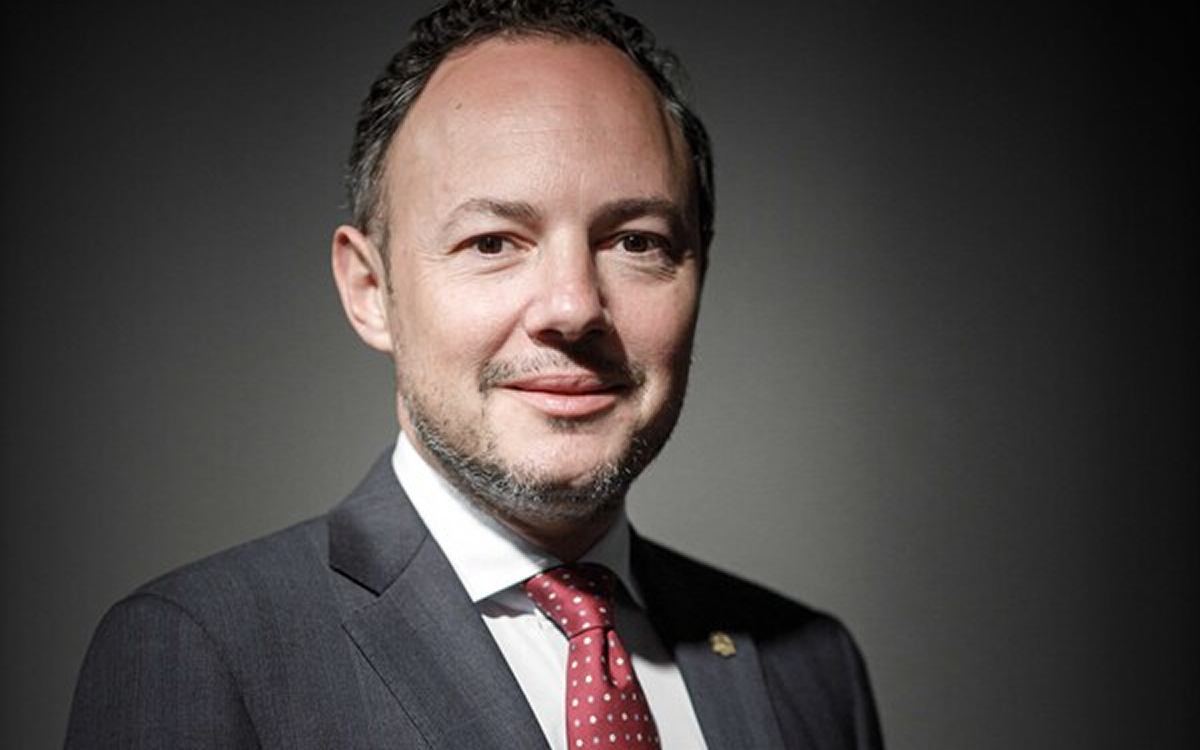
ANDORRA LA VELLA, Andorra — Andorran Prime Minister Xavier Espot Zamora has come out as gay.
“I’m gay. I’ve never hid it,” he said during an interview with Radio and Television of Andorra, the country’s public broadcaster, on Monday. “Now, if I’m not asked I don’t have to say it, in the sense that it doesn’t define the entirety of who I am and even less my personal politics, but at the same time I think it shouldn’t be a problem to express it. And if this helps many children, young people or teenagers who are going through a difficult time see that in the end, regardless of their condition or sexual orientation, you can prosper in this country and reach the highest magistracy, then I am happy to express it.”
Andorra is a small country known for its ski areas that is nestled between Spain and France in the Pyrenees.
Espot has been prime minister since 2019. The country’s lawmakers in 2022 extended marriage rights to same-sex couples.
The prime minister is one of a handful of heads of state and government who are openly gay or lesbian.
Latvian President Edgars Rinkēvičs took office in July.
Luxembourgish Prime Minister Xavier Bettel has been in office since 2013, while Ana Brnabić became Serbia’s prime minister in 2017. Irish Prime Minister Leo Varadkar is openly gay.
Deputy Belgian Prime Minister Petra De Sutter is a transgender woman.
Then-Icelandic Prime Minister Jóhanna Sigurðardóttir in 2009 became the world’s first openly LGBTQ+ head of government.
Europe
Rikkie Valerie Kollé named Miss Netherlands 2023: Historic first
Rikkie Valerie Kollé was selected as Miss Netherlands and will represent her country at the 72nd Miss Universe pageant

LEUSDEN, Utrecht, the Netherlands – In a historic first for the beauty pageant where the finalist will go on to compete in the Miss Universe pageant, the title and tiara of Miss Netherlands was awarded to a 22-year-old transgender woman on Saturday, July 8 at the AFAS Theater in Leusden.
Rikkie Valerie Kollé was selected as Miss Netherlands and will represent her country at the 72nd Miss Universe pageant set to take place in El Salvador later this year. Kollé, a Dutch-Moluccan model and actress living in Breda succeeds her predecessor, Ona Moody.
In a press release, pageant officials noted that Nathalie Mogbelzada, 26, from Amsterdam, was named first runner-up while Habiba Mostafa and Lou Dirchs were awarded Miss Congeniality and Miss Social Media, respectively.
Reigning Miss Universe R’Bonney Gabriel from the United States attended the glittering event as a special guest.
Kollé will be the second transgender representative at the Miss Universe pageant after Spain’s Angela Ponce who participated in 2018.
NPR reported the 71-year-old competition first began allowing transgender contestants in 2012.
More trans women have been competing in the preliminary pageants in recent years. In 2021, former Miss Nevada Kataluna Enriquez became the first trans contestant in a Miss USA pageant. Trans woman and activist Daniela Arroyo González will compete for this year’s Miss Universe Puerto Rico title next month.
Thai business mogul Anne Jakrajutatip, a trans activist who is also transgender, bought the Miss Universe Organization last year. She has said she’s committed to advancing the organization as an inclusive platform and wants to transform the brand for the next generation.
NPR also noted that Kollé has another chance to make history: If she takes the Miss Universe title in December, she would be the first out trans woman to do so.
Europe
Turkish police detain dozens of Istanbul Pride march participants
Anti-LGBTQ crackdown expected to worsen after president re-elected
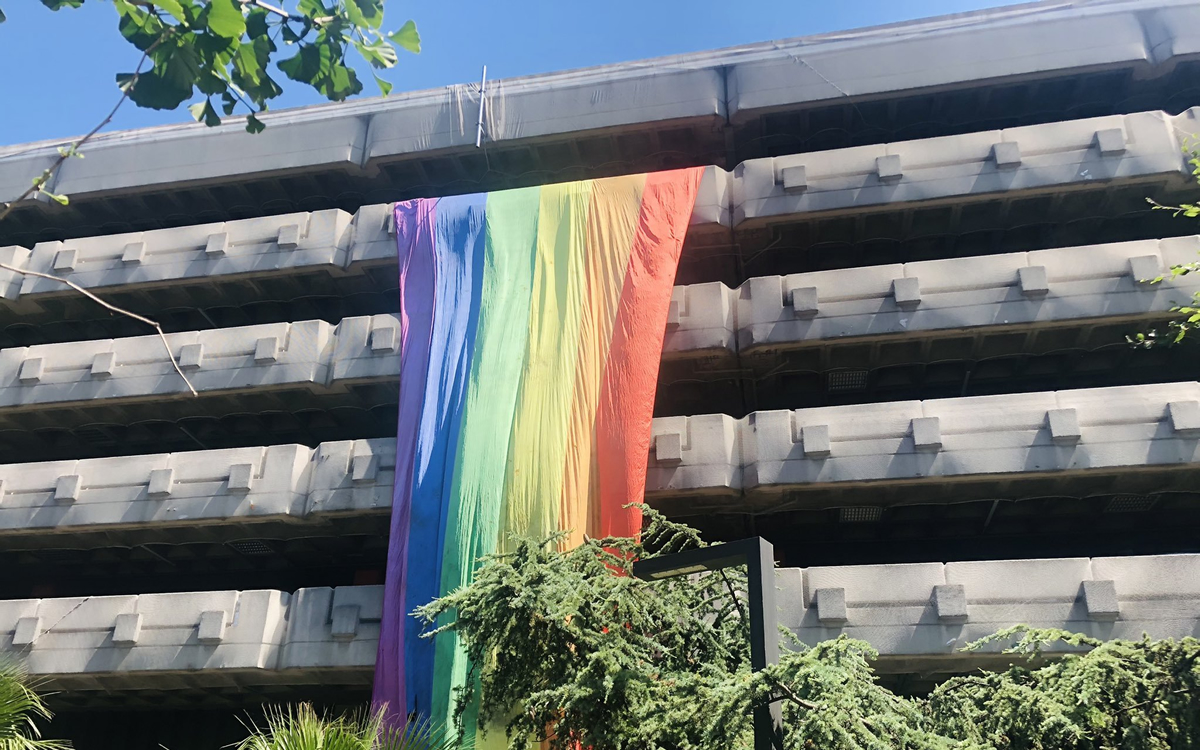
ISTANBUL — Turkish police on Sunday detained dozens of people after they participated in an Istanbul Pride march.
Reuters reported police in riot gear blocked access to the city’s Istiklal Avenue and Taksim Square and limited access to public transportation in the area.
The news agency noted police detained at least 50 people. An activist with whom the Washington Blade spoke on Sunday said police took 60 “of our friends … into custody.”
“Two of the people the police unlawfully took from the streets to take statements are under the age of 18,” said the activist.
Turkish authorities over the last decade have cracked down on LGBTQ+ and intersex activists in the country.
Police in 2015 used tear gas and water cannons against people who were about to participate in an Istanbul Pride march. Authorities in 2017 arrested nearly two dozen people who defied a ban on Pride events in the city.
Police in Ankara, the Turkish capital, on May 10, 2019, arrested 18 students and an academic who participated in a Pride march at the Middle East Technical University. They faced up to three years in prison, but a court in 2021 acquitted them. Police in 2022 violently broke up a Pride parade at the same Ankara university.
The State Department in 2021 criticized Turkey after police once again used tear gas to disperse Istanbul Pride march participants. Security forces last June arrested more than 370 people who tried to participate in another Istanbul Pride march.
The activist with whom the Blade spoke noted police in Izmir, the country’s third largest city, on Sunday detained at least 10 people who participated in a Pride march.
President Recep Tayyip Erdoğan, a former Istanbul mayor who has governed Turkey since 2003, won re-election on May 28. The activist and others across the country say they expect Erdoğan will further restrict on LGBTQ+ and intersex rights.
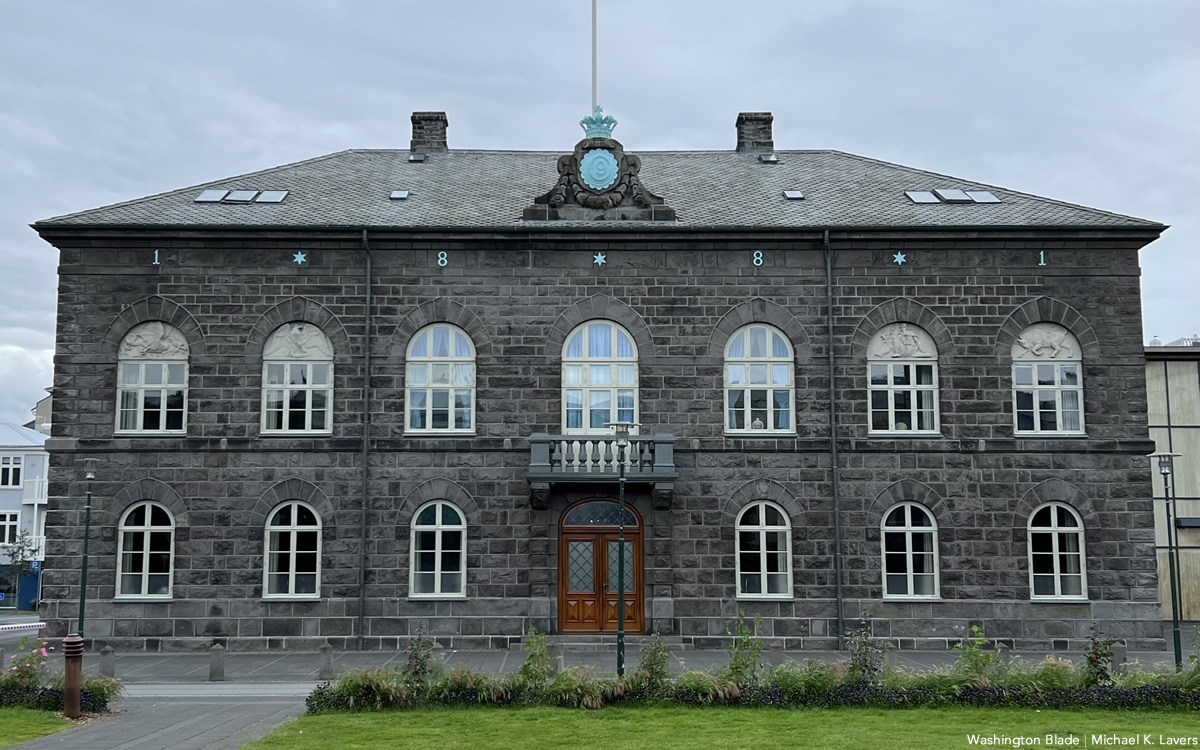
REYKJAVÍK, Iceland — Lawmakers in Iceland on June 9 approved a bill that will ban so-called conversion therapy in the country.
Media reports note 53 members of the Icelandic Parliament voted for the measure, while three MPs abstained. Hanna Katrín Friðriksson, an MP who is a member of the Liberal Reform Party, introduced the bill.
“This is a really important issue for all gay people and a step worth celebrating,” said Samtökin ’78, an Icelandic LGBTQ+ and intersex rights group, after the vote. “There is no cure for being gay and any attempt to do so is violence. It’s so good that the government recognizes it with legislation.”
Malta, Cyprus, Brazil and Ecuador are among the other countries that ban conversion therapy.
-

 Breaking News3 days ago
Breaking News3 days agoMajor victory for LGBTQ funding in LA County
-

 Features3 days ago
Features3 days agoKoaty & Sumner: Finding love in the adult industry
-

 Commentary1 day ago
Commentary1 day agoBreaking the mental health mold with Ketamine: insights from creator of Better U
-

 Miscellaneous2 days ago
Miscellaneous2 days agoCan you really find true love in LA? Insights from a queer matchmaker
-

 El Salvador3 days ago
El Salvador3 days agoLa marcha LGBTQ+ desafía el silencio en El Salvador
-

 Arts & Entertainment2 days ago
Arts & Entertainment2 days agoIntuitive Shana gives us her hot take for July’s tarot reading
